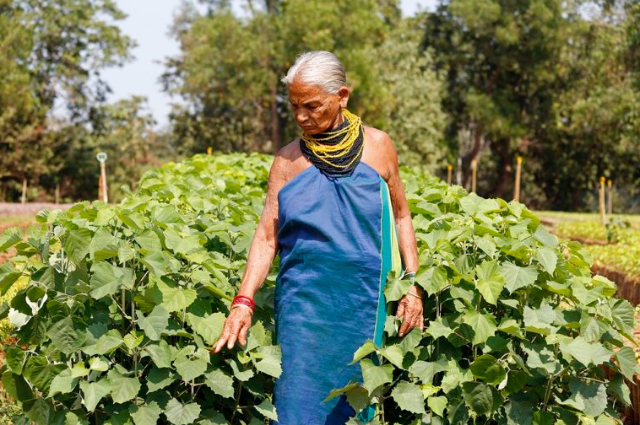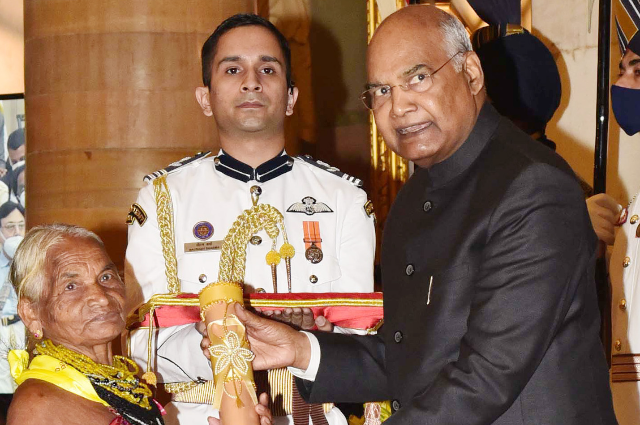
Source: nammankola.in
1944, Honnalli village. A tree goddess was born into a necessitous family of the indigenous Halakki Vokkalu tribe of Karnataka. Her father left for the other world when she was only two years old. Misfortune descended her life. After she grew up a little, she started assisting her mother who used to work in a local nursery as a daily-wage laborer. Thus, ceasing her opportunity of receiving formal education. A few years later, she was married off at the age of 10 or 12 which she doesn’t remember owing to the fact that she was a child bride then, to Govinde Gowda and she lost her husband in her 50s.
She worked as a daily-wage worker in the nursery where she was entrusted with the task of nurturing the seeds that were to be cultivated at the Karnataka Forestry Department. She specifically tended to the seeds that were part of the Agasur seedbed. After working as a daily-wage worker for 35 years, she was offered a permanent post in the nursery accrediting her knowledge of botany and her contribution towards the conservation of forests. She worked for next 15 years in the permanent post and finally decided to retire at the age of 70. The substantial number of years that she has spent in the Karnataka Forest Department, she has invaluably contributed in the afforestation measures taken up by the department through the traditional knowledge which she gained as a first-hand experience.
She has this spectacular ability to identify the mother tree of every species in the forest regardless of its location. Age and size are the two characteristics of the mother trees which makes them valuable as they are the most connected nodes in the forests which are used to the connect the mother tree and the saplings because the former provides nutrients to the latter. You would be surprised to know that she is also an expert in seed collecting. Now, what is seed collecting? It is the extraction of seeds from mother trees in order to regenerate the entire plant species. It is extremely important to collect the seeds at the peak of germination in order to ensure the survival of the seedlings and the tree goddess can decipher the exact time at which the process should take place.
The tribespersons of the Halakki Vokkalu community are known as the aboriginals of Uttara Kannada district in Karnataka and are mainly distributed in four taluks namely, Ankola, Kumta, Karwar, and Honnavar. The Vruksha Devata, meaning tree goddess, fondly called by this name by her tribe members, belongs to the Ankola taluk. They speak the Kannada language, less commonly known as Kanarese. Researchers and fellow ecologists call her the human ‘encyclopedia of forest’, because of the enormous knowledge that she possess about the silviculture. Now, can you guess whom I am talking about in the above-mentioned paragraphs? Yeah, you guessed it right! She is none other than ‘the bare-foot’ environmentalist Tulasi Gowda.
It is believed that Gowda has planted more than one lakh trees in Karnataka by herself. The saplings that she once sowed while working at the Ankola, Yellapur, and Sirsi have now grown into big trees. These contributions have made a significant impact on the lives of the people of her neighborhood and Karnataka. People wonder as to how Gowda gathered such an extensive knowledge about innumerable plants and herbs. When asked about the same, the Halakki matriarch infers that she too is unversed about it but as if “She can speak the language of the forests”.
Another noteworthy fact is that the Halakki Vokkalu tribe has an ingrained heritage where the matriarchy is connected to the nature and have exercised the charge of tending to the soil. Isn’t it amazing to note that even her name Tulasi is connected to the mother nature? It is as if she was destined to devote her life in nurturing and preserving mother nature. Tulasi is one of the manifestations of Goddess Lakshmi and is also the Holy Basil, a plant with numerous beneficial properties.
The Halakki tribe is well-known for their knowledge of medicinal plants which they mostly utilize as a preventive measure for a disease rather than its cure. Traditional knowledge such as this is passed down through generations and Tulasi is one such holder of it. She can identify more than 300 medicinal plants. She has planted more than 30,000 saplings and has been part of numerous environment conservation programs ever since she was 10 years old. Tulasi Gowda is always wrapped in a traditional sari, with jewelries around her neck and wrists and her hair tied into a bun and she had and continues to serve the nature in this simple attire which too is linked to the nature.
Other than environmentalism, Tulasi is a champion of women’s rights in her village. Gowda and singer Sukri Bomma Gowda have been struggling to protect a woman who was terrorized at gun-point and was almost knocked over by a landowner because she plucked a fruit from a tree. Citing this incident, both Tulasi and Sukri Bomma iterated at one press conference that never has any Halakki person felt the need to start a battle but they will protest if the wrongdoer is not punished for the crime.
Apart from a long career at the Karnataka Forestry Department, she has received numerous accolades for her work towards seed development, afforestation and forest conservation. In the year 1986, Gowda was bestowed with the Indira Priyadarshini Vrikshamitra Award (IPVM Awards), the same year when this award was constituted. The IPVM awards recognizes the contributions made by individuals and institutions who make noteworthy contributions in the field of afforestation and wasteland development. The awards include a medallion, a cash prize of 2.5 lakhs and a citation for each category.
Furthermore, in 1999, she was honored with the Kannada Rajyotsava Award, also known as the Karnataka Rajyotsava Prashasti, the second highest civilian award of the Karnataka state. Gowda was one of the 68 people and one of two people to be conferred with this honor in the field of environment. The awardees are given a 20-gm gold medal, one-million rupees and a citation.

On 26th January 2020, Tulasi Gowda was conferred with the Padma Shri, the fourth highest civilian award of India by President Ram Nath Kovind for her monumental contribution towards the conservation of trees. What really caught the attention of everyone was the fact the veteran environmentalist walked barefoot in the Durbar Hall of the Rashtrapati Bhavan to receive the award. She received plaudits for her humility; many even called “India’s barefoot wonder woman.” Her picture where she is seen greeting Prime Minister Narendra Modi and Home Minister Amit Shah also became a great hit.
In spite of the fact that Gowda has retired, she visits the nursery as and when she discovers a rare seed and she promotes awareness about tress and the conservation of nature among the children of the forest and is of the opinion that children should be made to plant trees and watch them grow in their lifetime. Only if the forests survive will the state, believes Gowda: a pearl of wisdom for the young minds.
It may be concluded by saying that Gowda is an epitome of the fact that illiteracy can never be an impediment in achieving and spreading good deeds. She might not have achieved formal education but she is environmentally way more literate than most of us who have the good fortune of receiving formal education yet we are so less literate environmentally.
